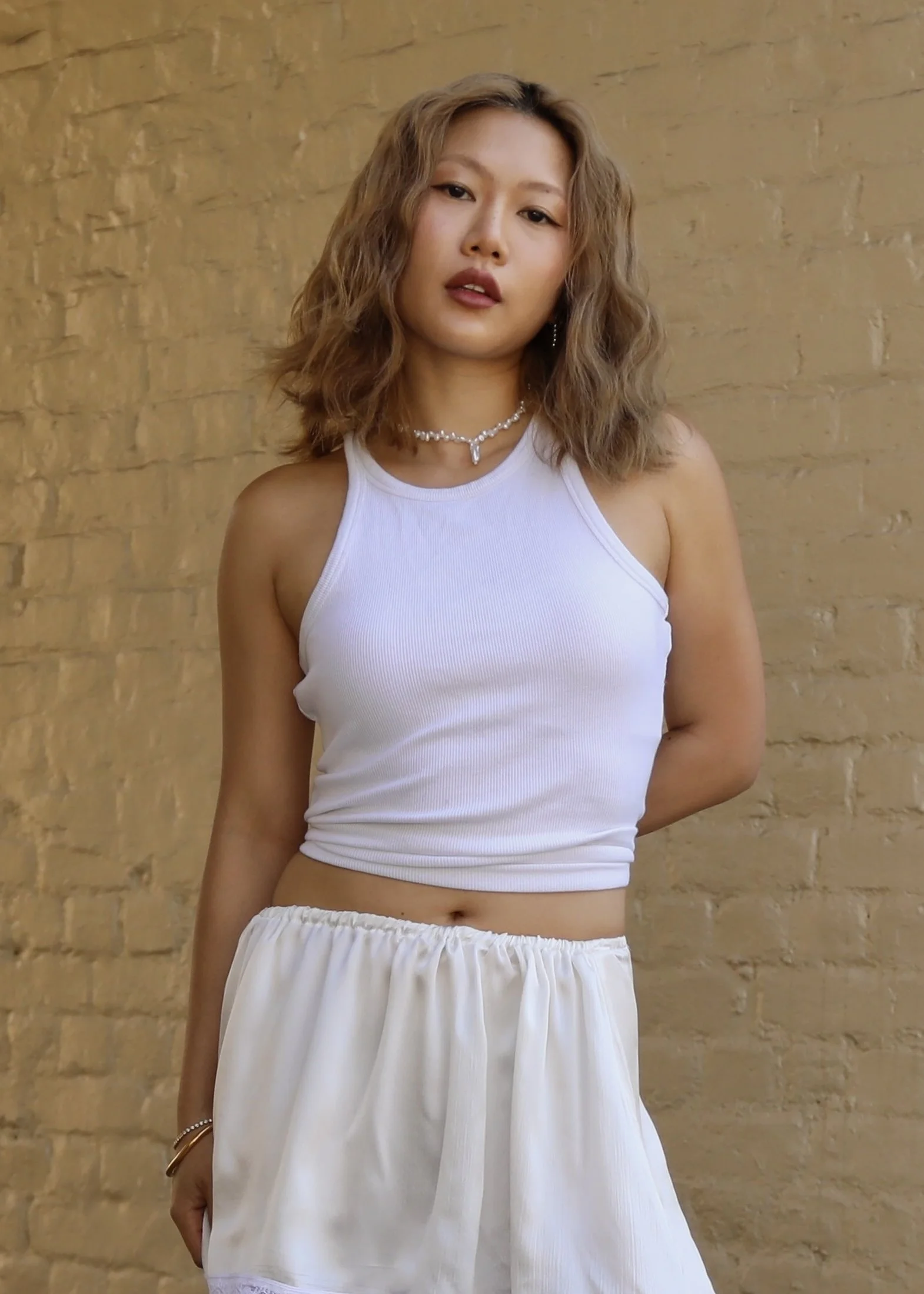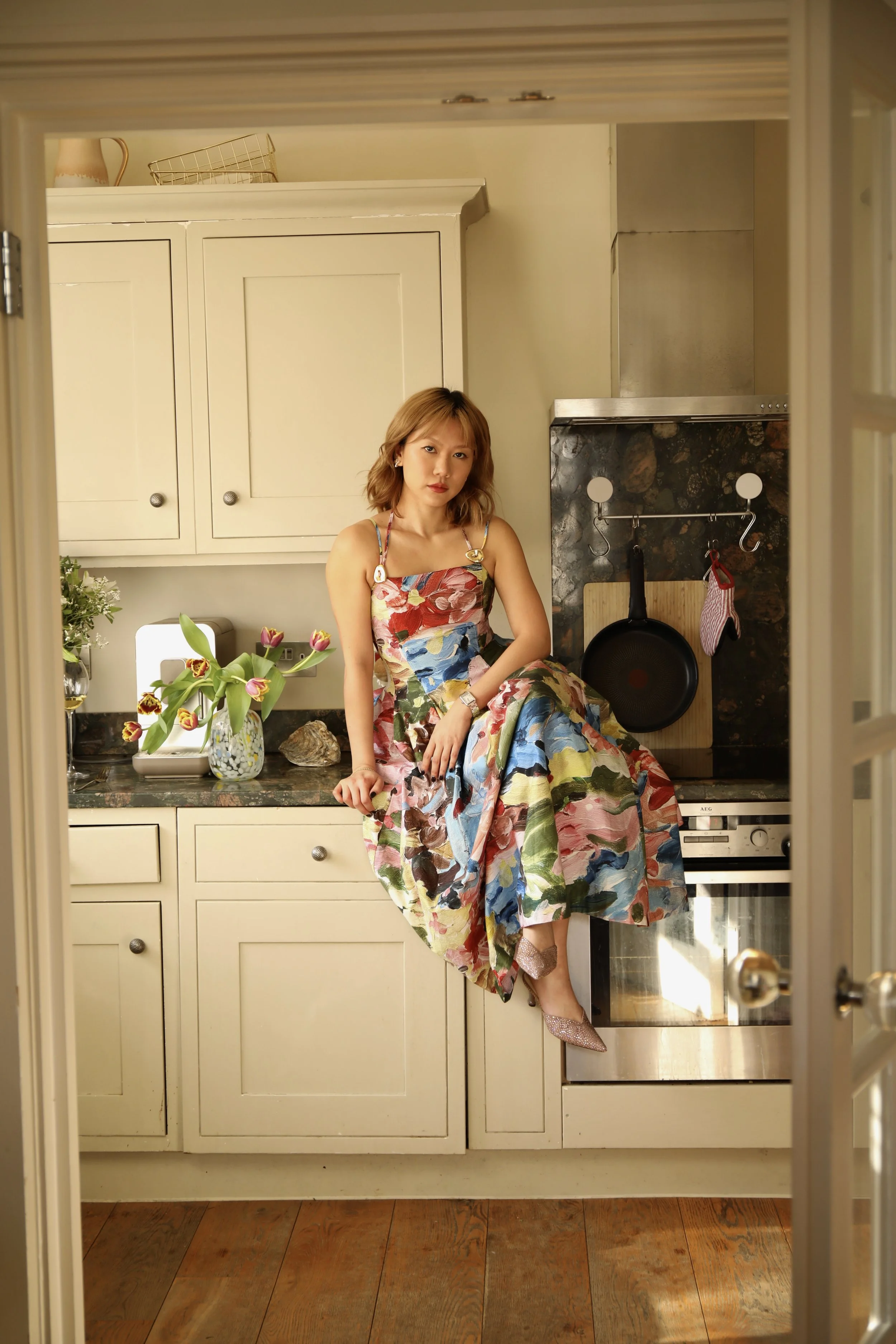Why Sewing Workshops Are Quietly Reshaping the Future of Sustainable Fashion
Featuring London based “The Sewn Assembly” by Andrea Cheong
In a culture obsessed with the new, fashion has often been at odds with sustainability. It’s an industry that celebrates reinvention, but rarely does it pause to examine its cost. Amidst this, a quiet revolution is unfolding—one that reclaims not only materials, but agency, ritual, and beauty in the everyday. At the heart of it is Andrea Cheong and her immersive workshop series, The Sewn Assembly.
Andrea Cheong is no stranger to the fashion world. A former journalist turned educator, she has spent years decoding the language of labels, calling out greenwashing, and empowering consumers to make mindful wardrobe choices through her viral Mindful Monday Method. But with The Sewn Assembly, she takes her mission offline—into tactile, human spaces where fashion is no longer passive, but deeply participatory.
The Intention Behind the Needle
Fashion has long been about expression, but the modern system has twisted that into excess. We buy more than ever and wear less than ever, with the average item discarded after just seven wears. Globally, over 92 million tonnes of textile waste are produced annually, and nearly 60% of clothing ends up in landfills within a year of production. This system isn’t just broken—it’s deeply unsustainable.
Sewing workshops are turning this narrative on its head. By encouraging participants to make, mend, or alter their own clothing, they offer something radical: reconnection.
The idea for The Sewn Assembly was born not from stats or trends, but from a shift in Andrea’s personal and professional landscape. After self-teaching herself to construct garments from scratch, she began hosting small-scale Mindful Mending Clubs around London—community-driven events designed to help people extend the life of their clothes. The emotional response was overwhelming.
“I saw that learning a new skill, being creative, but most of all feeling empowered over our wardrobes and how we present ourselves is so powerful,” Andrea shares. “I knew then that this was how I could push forward the mission of changing society’s attitudes towards the disposability of fashion.”
Each workshop under The Sewn Assembly umbrella is an intimate masterclass in clothing creation. Participants arrive to pre-cut, prepped fabric—usually reclaimed or vintage textiles—and are guided through machine and hand sewing techniques. They leave not only with a completed garment, but with the tangible memory of having made something with their own two hands.
Similar sewing workshops are gaining momentum in Paris, New York, Mumbai, and Melbourne—marking a return to tactile, intentional fashion education.
Stitching Against the Grain
Sewing isn’t just about thread and fabric—it’s about understanding the true value of a garment. When you’ve spent hours assembling a shirt or repurposing an old pair of trousers, your relationship to clothing changes fundamentally. You become less impulsive, more thoughtful, and far more critical of fast fashion’s quality shortcuts.
Educational formats like Sewn Assembly teach people to see through marketing tactics, understand garment construction, and value quality over volume—making them more informed, less wasteful consumers. Such workshops are a direct response to a global fashion crisis.
“In fashion, we’ve normalized buying clothes that fall apart in three washes,” Andrea says. “The disposability is built in. Sewing disrupts that.”
By engaging consumers in the process of garment-making, The Sewn Assembly shifts value from price tag to process. It invites people to slow down, ask questions, and understand the architecture of a garment. What does a seam do? How should a fabric drape? What does it feel like to wear something you made yourself?
“It’s not about being perfect. It’s about creating emotional equity with what we wear.”
In focus: Andrea Cheong, Founder of The Sewn Assembly | P.C. Alise Jane
Reclaiming Fashion as Safe Space
For Andrea, sewing is more than just craft. It’s a reclamation of identity, expression, and self-worth. “Fashion hasn’t always been a safe place for me,” she admits. “I had to unlearn what we’ve been taught about trends and retail therapy. These workshops offer a way to make fashion feel safe for others too.”
That emotional intelligence is woven into the very structure of The Sewn Assembly. The host-to-guest ratio is intentionally low, allowing for close mentorship. When a participant shows confidence, they’re gently encouraged to work more independently. When someone struggles, there’s time and space to meet them where they are.
The garments themselves reflect this ethos. Nothing is rushed. Patterns are custom. Fabrics—often cotton, linen, or reclaimed shirting—are chosen not just for their beauty, but for their workability. Even trims, often vintage or deadstock, are treated with reverence.
“I once offered silk in a class,” Andrea recalls with a smile. “It went surprisingly well, but I learned that quality isn’t just about expense—it’s about suitability. What’s responsible is giving people materials they can succeed with.”
Making as a Model for the Future
What The Sewn Assembly offers is more than nostalgia for handmade goods. It’s a working model for what fashion could become—localized, participatory, emotionally rich. It returns craftsmanship to the consumer, not just as a skill, but as a tool for self-definition.
Workshops vary in format and accessibility. The Mindful Mending Club is Andrea’s pay-what-you-can initiative, designed for absolute beginners. Here, participants learn simple techniques—darning, patching, hemming—over tea and conversation. It’s casual, welcoming, and intentionally low-pressure.
Then there’s the Self Made Studio: a more intensive experience where attendees craft full garments from raw materials. This is where technique and creativity converge. From understanding grainlines to mastering buttonholes, attendees walk away with more than just a piece of clothing—they leave with knowledge.
Andrea’s plans for the future reflect her belief in community-first sustainability. Her next concept, Sip & Stitch, will be a hybrid event: part studio, part social club. “You’ll be able to sew, sip wine, and maybe meet your new best friend,” she laughs. “It’s about removing the barriers to entry and making this way of living feel joyful.”
Reframing the Narrative
So much of what’s marketed as sustainable fashion today still centres on consumption—just in ‘greener’ packaging. The Sewn Assembly is a stark departure from that model. It doesn’t sell a product. It teaches a practice. It reframes the consumer as maker, the garment as archive, the act of sewing as a radical kind of care.
And people are responding. Repeat attendees are common, with around 25% returning to deepen their skills—some to mend, others to assemble full garments. Past workshops have inspired guests to continue sewing beyond the studio. Meanwhile, the upcoming Coal Drops Yard session will see participants up-cycle reclaimed shirts into custom boxer shorts, a hands-on introduction to garment construction and mindful making.
There’s no ego here, no gatekeeping. Just the gentle reminder that clothing is not disposable, and neither are we.
Stitching is more than a survival skill in 2025. It is about our connection with what we wear and how we can hold onto it longer
Beyond DIY: This is a Design Revolution
From sourdough baking to natural dyeing, the rise of “slow skills” in recent years is no accident. It’s a reaction to hyper-speed consumer culture. Sewing sits at the intersection of sustainability, therapy, and creativity—an act that is both practical and poetic. For younger generations, especially Gen Z, these workshops offer more than a hobby—they offer purpose. Many participants report mental wellness benefits from the meditative repetition of sewing, as well as the satisfaction of creating something tangible in a digital world.
Far from being a niche craft or nostalgic throwback, workshops like Sewn Assembly are contributing to a larger design conversation. When more people understand how garments are made—and what goes into quality—expectations shift. So does demand.
When the pressure to constantly buy new clothes is replaced with the pride of making or remaking something by hand, fashion becomes a space of ownership, not overwhelm.
Why This Matters Now
The rise of sewing workshops represents something far greater than a lifestyle trend. They signal a movement: one that values time, skill, quality, and connection. Whether it’s through learning to hem trousers, craft a linen blouse, or transform an heirloom sari into something new, participants are rediscovering the soul of fashion. And perhaps most importantly, they’re beginning to ask: if I can make it myself, why would I settle for less?
As fashion reckons with its impact—on people, planet, and culture—initiatives like The Sewn Assembly offer a roadmap for conscious design. Not just in what we wear, but in how we engage. The value is no longer in how much we can consume, but in how much we can create, preserve, and pass on.
In an industry often built on artifice, that’s a rare luxury. As her upcoming workshops fill and new formats emerge, one thing is certain: the future of sustainable fashion won’t just be about circularity, or regulation, or innovation. It will be about reintroducing human hands, and hearts, into the process. And Andrea Cheong’s The Sewn Assembly is sewing the seams of that future—one stitch at a time.
Interested in attending Andrea’s Upcoming Workshop in London? Sign up using the link below…
The Sewn Assembly at Coal Drops Yard, London
Date: Sunday 27th July
Sessions: 10:30am–1:00pm & 2:00pm–4:30pm
Location: Are You Mad?, Unit 5, Level 1, Coal Drops Yard, King’s Cross
Sign Up: The Sewn Assembly in London





